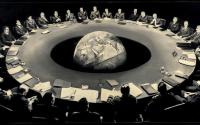14 April 2005utne.com
The environmental movement was largely built on opposition to nuclear power. Who can forget the high seas adventures of Greenpeace's flagship, the Rainbow Warrior, in the 1970s and 80s, sailing its ragtag crew into danger zones in the Pacific to stop US and French nuclear tests? Or the anti-nuke campaigns of the German Green Party, whose members laid themselves across train tracks to block shipments of nuclear fuel and radioactive waste? No issue is as integral to the identity of modern environmentalists.
No issue, that is, except perhaps global warming; which is why a number of prominent environmentalists have begun to rethink their positions on nuclear power. In the past year, British scientist James Lovelock, developer of the Gaia theory, futurist Stewart Brand, founder of the Whole Earth Catalog, Hugh Montefiore, longtime trustee of Friends of the Earth, and others have publicly called for massive new investments in nuclear energy. "The primary cause of global climate change is our burning of fossil fuels for energy," writes Brand in Technology Review. "So everything must be done to increase energy efficiency and decarbonize energy production."
The argument is that nuclear power is a proven technology, which has come a long way in terms of safety and efficiency since the days of the Three Mile Island and Chernobyl disasters. "Clean coal, solar-powered roof tiles, wind farms in North Dakota -- they're all pie in the emissions-free sky," converted nuke boosters Peter Schwartz and Spencer Reiss write in the February issue of Wired. "But zero-carbon reactors are here and now. We know we can build them. Their price tag is no mystery. They fit into the existing electric grid without a hitch. Flannel-shirted environmentalists who fight these realities run the risk of ending up with as much soot on their hands as the slickest coal-mining CEO."
Problems like waste storage, accidents, high construction costs, and the danger of weapons-grade material falling into the wrong hands are surmountable, says Brand, if environmentalists would take the reins. "The best way for doubters to control a questionable new technology is to embrace it, lest it remain wholly in the hands of enthusiasts who think there is nothing questionable about it."
As for slick energy company CEOs: Paul Anderson, chief of Duke Energy, a North Carolina coal and nuclear utility, has undergone something of a climate-change conversion. In a letter to shareholders last week, reports the Associated Press, he announced his company's decision to lobby for a tax on carbon-dioxide emissions. His argument, as outlined in a recent speech: "If we (the US energy industry) ignore the issue, we would be the easy target. The worst scenario would be if all 50 states took separate actions and we have to comply with 50 different laws."






